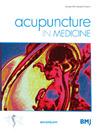针刺治疗前列腺切除术后持续性尿失禁:一个病例系列。
IF 2.4
3区 医学
Q2 INTEGRATIVE & COMPLEMENTARY MEDICINE
引用次数: 0
摘要
本文章由计算机程序翻译,如有差异,请以英文原文为准。
Acupuncture treatment for persistent post-prostatectomy urinary incontinence: a case series.
Radical prostatectomy is considered to be the best treatment for patients with localized and locally advanced prostate cancer. Unfortunately, post-prostatectomy urinary incontinence (PPUI) is a common complication, with an incidence ranging from 4% to 31%.1 PPUI can adversely affect quality of life and cause emotional and financial distress. For most patients, PPUI improves to near baseline levels within 12 months of surgery. However, only a minority of patients with residual PPUI at 12 months experience sustained improvement. Implantation of an artificial urinary sphincter (AUS) represents the gold standard of treatment, although its widespread adoption is limited due to high costs and a significant risk of requiring surgical revision. Hence, early intervention to facilitate patient recovery within 12 months is desirable. For persistent PPUI patients, especially the elderly, we hope to find a safe and non-invasive treatment option that can improve symptoms. Acupuncture is widely used in the treatment of various types of urinary incontinence due to evidence of its effectiveness, the simple nature of the procedure, and its minimal side effects. Electroacupuncture can reduce urine leakage in women with stress urinary incontinence (SUI),2 but relatively little is known about its efficacy and safety for men with PPUI, in whom the quality of evidence is considered to be low. Herein, we report on the use of acupuncture in five patients with persistent PPUI who received routine clinical care at our center.
求助全文
通过发布文献求助,成功后即可免费获取论文全文。
去求助
来源期刊

Acupuncture in Medicine
INTEGRATIVE & COMPLEMENTARY MEDICINE-
CiteScore
4.70
自引率
4.00%
发文量
59
审稿时长
6-12 weeks
期刊介绍:
Acupuncture in Medicine aims to promote the scientific understanding of acupuncture and related treatments by publishing scientific investigations of their effectiveness and modes of action as well as articles on their use in health services and clinical practice. Acupuncture in Medicine uses the Western understanding of neurophysiology and anatomy to interpret the effects of acupuncture.
 求助内容:
求助内容: 应助结果提醒方式:
应助结果提醒方式:


